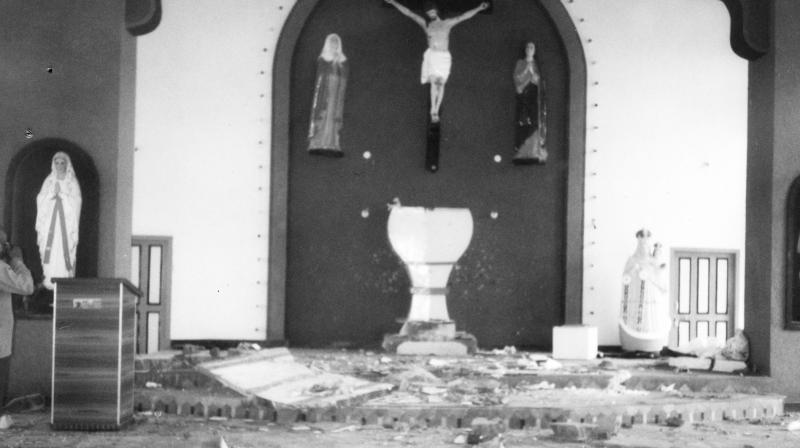Outfits that attack churches lying low but active

Hyderabad: Their office, or rather headquarters, in Asifnagar, Khankha-e-sarwar-e-alam, which comprises a mosque and a tomb behind, witnesses religious activity even as the Hyderabad police and the Intelligence wing keep a close eye on their activities.
The members of this organisation, which was banned in 2001, keep a low profile. Once a year they approach the local police seeking permission to take out a Milad-un-Nabi procession, which is denied, besides holding regular meetings.
For the policemen who spent most part of their career working on terrorism-related cases, the deadly bomb blasts in Sri Lanka which claimed over 290 lives and left 500 wounded on Easter Sunday, comes as a grim reminder of the multiple blasts carried out in churches across undivided AP, Karnataka and Goa, allegedly by members of the Islamist extremist organisation Deendar Anjuman, back in 2000.
By May 2001, the outfit was banned for engineering the blasts and carrying out a hate campaign against the Christian community.
“The members of Deendar Anjuman may be lying low but they do keep meeting each other regularly. Going by the available information, they have not been indulging in anti-India activities so far but that does not mean that they cannot plan one. The foreign funds which the outfit used to get earlier have stopped. Though the outfit is banned, the organisation and its members are very much there,” a senior police official, in the know of the goings-on in the Deendar Anjuman camp, told DC.
The organisation, declared as unlawful in 2001, was held responsible for bombing a Christian congregation at Machilipatnam on May 21, 2000. On May 28, 2000, they were accused of triggering bomb blasts in churches at Medak and Vikarabad.
In June the same year, two bombs exploded at the St Ann’s Church in Wadi, a blast occurred in the St Andrews Church in Vasco, Goa. In July, two more churches were bombed in Andhra Pradesh, Gewett Memorial Baptist Church in Ongole and Mother Vannini Catholic church in Tadepalligudem.
Almost all of them were low-intensity explosions and left the victims injured but they were enough to scare not only the Christian community but the entire country. “It was a new phenomenon back then as churches were hardly targeted in this manner,” said an official who was part of the team that investigated the blasts.
In July the same year, a blast was triggered at the St John’s Lutheran Church in Hubbali and another at St Peter Paul Church in Bengaluru. The Deendar Anjuman members vehemently denied that their organisation was involved and tried to blame certain Hindu outfits.
“The conspiracy to target churches was hatched in October 1999 in the headquarters of Deendar Anjuman in Asifnagar in Hyderabad. The prime accused in the case, Zia Ul Hassan, son of Syed Siddique Hussain, the founder of the outfit, has migrated to Pakistan. The outfit believed that triggering blasts in churches would trigger ‘nifaque (hatred between communities, Hindus and Christians)’. Their agenda, like other terror outfits, was to make India an Islamic country,” an official said, adding that Siddique began hating Christians after the British colonial government in 1934 jailed him and 18 of his followers for indulging in inflammatory speeches and propaganda.
In connection with the bomb blasts, 71 accused were identified and 29 cases registered in AP, Karnataka and Maharashtra on Deendar activists. Among the 71, police records say, 25 underwent militant training in Pakistan.
“‘The Deendar followers still stay in many parts of south India including Hyderabad, Andhra Pradesh, Karnataka and Tamil Nadu and in all states, they are under watch,” officials said.
It was in 2008 that capital punishment was awarded to 11 people and life sentence to 12 others by a local court while many were acquitted for lack of evidence.
Police records describe the Deendar Anjuman as a “fanatic Muslim sect” with the sole objective of Islamising India through proselytisation and preaching. The followers of Deendar pray in the mosques of other Sunni Muslims and have emerged as a separate sect within the Sunni sect.

